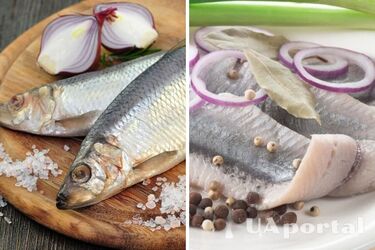Healthy inexpensive fish that contains all the necessary trace elements

BLOG
What does herring give us?
It contains a lot of fat, but these are healthy fatty acids, mainly omega-3. ⠀
Herring is one of the best sources of omega-3 fatty acids. With a daily need of 1 to 1.5 g per day, 100 g of herring contains 2.4 g of omega-3 fatty acids, which are necessary for proper nutrition because they are not produced in the body, and are important for health: ⠀
- DHA, a type of omega-3 fatty acid, is a valuable structural component of the brain and retina. Lack of sufficient DHA can cause vision problems.⠀
- Most medications for pregnant women contain DHA fatty acids. This is not surprising, as studies have shown that they can affect a child's intelligence, social skills, and reduce the risk of developmental delays.
- They have a positive effect on the cardiovascular system for several reasons: they can cause a decrease of triglycerides, increase HDL cholesterol, prevent loss of arterial elasticity, and effectively reduce inflammation.
- People who regularly consume omega-3 fatty acids are less likely to suffer from depression.
- They improve the condition of our skin, and keep it soft, moist and elastic, preventing premature wrinkles.
In addition, herring contains iodine. 100 g of this fish will provide almost half of the daily dose of this element necessary for thyroid function. Selenium is also important for the thyroid. Herring has quite a lot of it - about 37 mcg, with a minimum daily requirement of 50 mcg.
Herring contains powerful antioxidants: vitamin E and selenium. Both of these nutrients are important for the immune system. They help minimize the damage caused by free radicals.
This fish contains everything that we should eat it for: minerals, vitamins, amino acids, and healthy fats.

